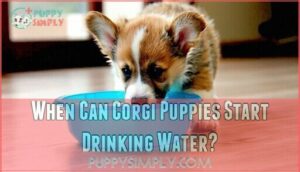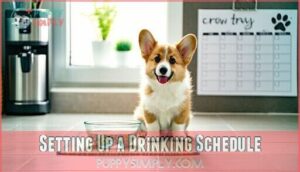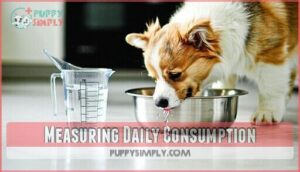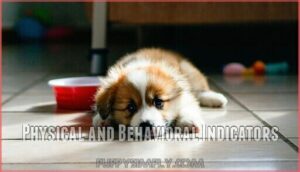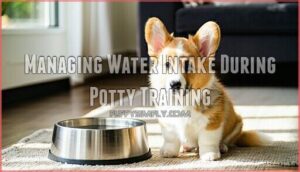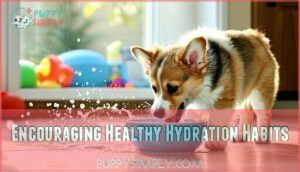This site is supported by our readers. We may earn a commission, at no cost to you, if you purchase through links.

Hot weather and active play increase these requirements, while individual metabolism creates variation between dogs. Watch for dehydration signs like lethargy, dry gums, and dark urine.
You’ll want to balance hydration with potty training schedules, but don’t restrict access completely. Understanding your corgi’s unique hydration patterns becomes easier once you know the warning signs to watch for.
Table Of Contents
- Key Takeaways
- How Much Water Should a Corgi Puppy Drink?
- Why is Hydration Essential for Corgi Puppies?
- When Can Corgi Puppies Start Drinking Water?
- Factors That Influence Puppy Water Needs
- How to Monitor Your Corgi Puppy’s Water Intake
- Signs of Dehydration in Corgi Puppies
- Managing Water Intake During Potty Training
- Can Corgi Puppies Drink Too Much Water?
- Encouraging Healthy Hydration Habits
- When to Consult a Veterinarian About Hydration
- Frequently Asked Questions (FAQs)
- Conclusion
Key Takeaways
- You’ll need to provide half to one ounce of water per pound of body weight daily – a 10-pound corgi puppy should drink 5-10 ounces, with fresh water available throughout the day.
- Watch for dehydration signs like lethargy, dry gums, and dark urine while monitoring your puppy’s drinking patterns, especially during hot weather and after exercise, when water needs increase.
- You can start offering water around 3-4 weeks of age during the weaning process, but don’t restrict access completely even during potty training – balance hydration with housetraining schedules.
- Contact your vet if you notice sudden changes in drinking habits, like excessive thirst, water refusal, or persistent dehydration symptoms that don’t improve with increased water access.
How Much Water Should a Corgi Puppy Drink?
Your Corgi puppy needs approximately half to one ounce of water per pound of body weight each day, which means a 15-pound puppy should drink between 7.5 and 15 ounces daily.
Keep an eye on how much they’re drinking since staying hydrated supports their fast growth and prevents dehydration-related health issues.
Daily Water Intake Guidelines
Calculating your Corgi puppy’s hydration needs starts with a simple formula: ½ to 1 ounce of water per pound of body weight daily. A 10-pound Corgi puppy requires 5-10 ounces daily. Fresh water should be available throughout the day, but monitoring intake helps prevent dehydration.
Puppies eating dry kibble need more water than those on wet food. Environmental impact matters too—hot weather and active play increase requirements.
Puppy hydration is essential for healthy growth and development.
Age and Weight Calculations
Your Corgi puppy’s weight determines their daily water needs through simple calculations. For weight-based needs, provide ½ to 1 ounce per pound of body weight.
Age-related intake varies: younger puppies need frequent small amounts, while older ones follow standard intake calculation methods.
Puppy growth affects hydration requirements, so adjust portions as they develop. Use hydration charts or a dog water intake calculator to track needs accurately.
Why is Hydration Essential for Corgi Puppies?
Your Corgi puppy’s body relies on proper hydration to foster rapid cell growth, organ development, and essential metabolic processes that keep their little systems running smoothly.
Without adequate water intake, you’ll risk serious health complications including kidney problems, digestive issues, and temperature regulation difficulties that can quickly become life-threatening in growing puppies.
Without enough water, your puppy faces life-threatening kidney problems, digestive issues, and dangerous overheating
Growth and Development Benefits
Your Corgi puppy needs plenty of water to grow strong and healthy. When puppies stay well-hydrated, their cells work better at moving nutrients around their developing bodies.
Good hydration helps your puppy’s organs develop properly as their body systems learn to work together. When your pup drinks enough water, their body can actually use those important vitamins and minerals from their food.
Water also aids cognitive function and bone growth, critical aspects of puppy development that require consistent attention to the importance of water for puppies during this key stage.
Preventing Health Issues
Think of water as your Corgi puppy’s first line of defense against health problems. When puppies don’t get enough fluids, they’re vulnerable to kidney damage, painful urinary tract issues, and life-threatening overheating.
Water maintains proper electrolyte balance and aids recovery during deworming treatments. Recognizing signs of dehydration early helps prevent these preventable conditions from developing in your growing companion.
When Can Corgi Puppies Start Drinking Water?
Your corgi puppy can start drinking water around 3 to 4 weeks of age, which coincides with the weaning process when they begin shifting from their mother’s milk.
This timing allows their digestive system to gradually adapt to processing water independently, setting the foundation for healthy hydration habits throughout their development.
Transition From Mother’s Milk
Around three to four weeks old, your Corgi puppy begins the milk to water shift as part of their natural weaning process. This gradual introduction helps their digestive system adapt to new nutritional sources beyond mother’s milk.
This shift needs some watching since weaning can stress puppies and change how much water they need.
Put out small bowls of fresh water next to where mom nurses, and let your pup figure out drinking at their own pace.
Weaning Timeline
When your Corgi puppy reaches the weaning age around 3-4 weeks, the milk shift begins gradually. Puppy hydration needs evolve as solid introduction starts, requiring careful attention to water intake during this critical period.
- Week 3-4: Begin offering shallow water dishes alongside mother’s milk
- Week 5-6: Introduce moistened puppy food while maintaining water access
- Week 6-7: Gradual reduction of nursing frequency increases water dependency
- Week 7-8: Complete weaning requires consistent fresh water availability
- Week 8+: Established hydration changes promote independent Corgi care and maintenance
Factors That Influence Puppy Water Needs
Your corgi puppy’s water needs aren’t one-size-fits-all, since several key factors determine how much they should drink each day. Understanding these variables, including your pup’s size, activity level, and the weather conditions, helps you provide the right amount of hydration for their growing body.
Size and Breed Differences
Your puppy’s breed and size directly impact hydration needs. Smaller corgis require less water than larger breeds, with breed-specific needs varying considerably. Individual metabolism and canine hydration patterns differ between dogs. Proper hydration is key, and you can use a water intake calculator to determine your puppy’s specific needs.
| Weight Range | Daily Water Intake |
|---|---|
| 4-10 lbs | 2-10 oz |
| 11-20 lbs | 5-20 oz |
| 21-30 lbs | 10-30 oz |
| Adult Corgi | 15-25 oz |
| Mini Corgi | 8-15 oz |
Size-related intake calculations help determine proper hydration levels for your specific puppy.
Activity Level and Exercise
Active puppies naturally require more hydration than their couch-potato counterparts. Exercise intensity directly affects your puppy’s water needs, with training sessions and outdoor adventures increasing post-activity thirst.
Monitor playtime hydration closely, as energetic Corgis can quickly become dehydrated. A dog water intake calculator helps track consumption during busy days.
Always provide fresh water immediately after exercise to foster proper dog health and puppy drinking water habits.
Climate and Season
Weather plays a major role in your corgi puppy’s hydration needs. Summer hydration becomes more demanding as temperatures rise, requiring seasonal adjustments to prevent dehydration in dogs. Hot, humid conditions increase water intake needs a lot.
Winter concerns include dry indoor air from heating systems. Regional variations matter too – desert climates demand constant water availability while cooler regions allow more flexibility in puppy hydration management.
How to Monitor Your Corgi Puppy’s Water Intake
You’ll want to track your corgi puppy’s water intake to make certain they’re getting the right amount each day, which helps prevent both dehydration and overhydration.
By measuring their daily consumption and establishing a consistent drinking schedule, you can spot any changes in their drinking patterns that might signal health concerns.
Setting Up a Drinking Schedule
Managing your puppy’s water during housetraining doesn’t have to be complicated. Give them water breaks every two to three hours and keep fresh water available throughout the day. Add extra hydration after meals and playtime when they need it most.
When using a crate, offer water before crate time but take it away thirty minutes before bedtime – this keeps them hydrated while supporting your potty training efforts.
Measuring Daily Consumption
Once you’ve established a schedule, tracking your puppy’s actual water intake becomes your next priority. Use consistent measurement tools like marked water bowls or measuring cups to monitor daily consumption.
Individual puppy needs vary based on activity levels, so adjust portions accordingly. A dog water intake calculator can help establish baselines, though hydration monitoring apps aren’t necessary for most owners tracking fluid intake patterns.
Signs of Dehydration in Corgi Puppies
You’ll want to recognize dehydration signs quickly, since puppies can become dehydrated faster than adult dogs due to their smaller size and higher water needs.
Watch for telltale symptoms like sticky gums, decreased skin elasticity, dark yellow urine, and lethargy, which can indicate your corgi pup isn’t getting enough fluids.
Physical and Behavioral Indicators
Spotting dehydration early can save your puppy from serious health problems. Watch your Corgi’s energy levels, drinking habits, and body temperature closely. Dehydrated puppies often show these warning signs:
- Lethargy and reduced energy – Your normally playful pup seems tired or uninterested in activities
- Changes in drinking habits – Either drinking excessively or avoiding water altogether
- Altered behavior patterns – Decreased appetite, excessive panting, or unusual restlessness
These physical and behavioral indicators appear before more serious symptoms develop.
Checking Gums and Skin Elasticity
Gentle pressure is key when checking your puppy’s hydration status. Press your thumb against their gums—healthy gums should be pink and moist, returning to normal color within two seconds.
For the skin turgor test, gently pinch the skin on their neck. Well-hydrated skin snaps back immediately, while dehydrated skin stays "tented."
These simple elasticity tests help assess dog hydration between veterinary checkups.
Urine Color and Frequency
Your puppy’s urine tells you everything about their water intake and overall health. Well-hydrated pups produce pale yellow urine frequently throughout the day, while dehydration creates dark, concentrated urine with strong odors.
Monitor consistency—sudden frequency variations or urinary issues warrant veterinary advice. A simple urine color chart can help track hydration indicators effectively.
Managing Water Intake During Potty Training
You’ll need to balance keeping your corgi puppy properly hydrated while establishing consistent potty training routines.
Managing water access strategically, especially during evening hours, helps reduce nighttime accidents without compromising your puppy’s health needs.
Balancing Hydration and Housetraining
Your puppy’s hydration needs and housetraining goals can work together with smart planning. Managing water intake during housetraining requires strategic timing rather than restriction. Here’s how to maintain proper Puppy Care and Hydration while supporting potty training success:
- Schedule regular water breaks every 2-3 hours to establish a Hydration Schedule that prevents Nighttime Accidents
- Monitor your puppy’s water intake closely during active housetraining phases without limiting access completely
- Use Reward Hydration techniques by offering fresh water after successful potty breaks outside
- Maintain Crate Water Access during longer confinement periods to prevent dehydration stress
- Create a Potty Training Balance by timing water offerings with scheduled outdoor trips for best results
Nighttime Water Access
Managing nighttime water intake requires balancing your puppy’s hydration needs with successful housetraining. Remove water bowls two to three hours before bedtime to reduce nighttime accidents, but make sure there’s adequate daytime water intake.
Place bowls away from sleeping areas to minimize sleep disruption. Your puppy’s bladder capacity improves with age, so adjust hydration timing accordingly. Monitor for signs of thirst while maintaining consistent housetraining progress.
Can Corgi Puppies Drink Too Much Water?
While you’re keeping a close eye on your corgi puppy’s water intake, it’s possible for them to drink too much water, which can lead to water intoxication or bloat.
You’ll want to watch for signs like excessive urination, vomiting, or unusual lethargy, as these might indicate your pup is overdoing it with their water bowl.
Risks of Overhydration
Water intoxication poses serious risks when your Corgi puppy drinks excessively. This dangerous condition causes hyponatremia signs like vomiting, lethargy, and seizures as blood sodium levels drop.
When your Corgi puppy drinks way too much water, it can lead to water intoxication—a scary situation that’s more common than you’d think. As all that excess water floods their system, it dilutes their blood sodium to dangerous levels, triggering symptoms like vomiting, unusual tiredness, and in severe cases, seizures.
Overhydration can quickly become life-threatening, requiring immediate veterinarian attention to prevent severe complications in your puppy.
Recognizing Excessive Drinking
Beyond normal thirst, you’ll notice polydipsia symptoms when your Corgi puppy drinks excessively throughout the day. Watch for water intoxication signs like vomiting, lethargy, or bloating after your dog drinks large amounts.
Underlying conditions such as diabetes or kidney issues can trigger excessive drinking, while behavioral causes include boredom or stress.
If overhydration risks concern you, seek veterinary diagnosis and advice for proper guidance.
Encouraging Healthy Hydration Habits
You can establish positive drinking habits that’ll keep your corgi puppy properly hydrated throughout their development.
Creating an appealing water station with clean bowls, fresh water, and strategic placement near food and play areas makes staying hydrated feel simple and natural for your growing pup.
Making Water Appealing
Some puppies turn their noses up at plain water, but you can make hydration fun. Try flavored ice cubes made with bone broth or adjust water temperature – room temperature works best.
Moving your puppy’s water bowl to different spots encourages exploration. Water fountains create playful hydration opportunities that many puppies find irresistible compared to still water.
Cleaning Water Bowls Regularly
Clean water bowls create a foundation for your puppy’s health. Bowl Material Matters since stainless steel resists Biofilm Buildup better than plastic. Daily Cleaning Frequency prevents Bacteria growth that can make your puppy sick.
- Use Safe Cleaners like mild dish soap, avoiding harsh chemicals
- Scrub thoroughly to remove invisible bacterial films
- Rinse completely before refilling with fresh water
This simple puppy care routine keeps your puppy’s water bowl safe and appealing.
Safe Fluid Alternatives
While clean bowls matter, you might wonder about other fluids. Unsweetened Pedialyte offers electrolyte solutions for mild dehydration, but consult your veterinarian first. Bone broth and low-sodium chicken broth can encourage water intake when diluted. Goat milk provides nutrients but should be limited. Coconut water contains natural electrolytes but isn’t necessary for healthy puppies.
Plain water remains the best choice for canine health and ideal puppy water intake.
When to Consult a Veterinarian About Hydration
You’ll want to contact your veterinarian if your corgi puppy suddenly drinks much more or much less water than usual, since these changes can signal underlying health problems.
Don’t wait if you notice persistent signs like lethargy, dry gums, or excessive urination, as these symptoms require professional evaluation to rule out serious conditions.
Unusual Drinking Patterns
Watch for sudden changes in your puppy’s water intake, as these can signal underlying health issues. Increased thirst might indicate diabetes or kidney problems, while decreased thirst or water aversion could suggest illness.
If your corgi puppy dramatically alters drinking habits overnight, schedule a veterinary checkup promptly. Monitoring these patterns helps maintain canine health and prevents dehydration in dogs.
Persistent Signs of Dehydration or Overhydration
When concerning symptoms persist despite your care efforts, don’t hesitate to contact your veterinarian. Chronic dehydration shows through ongoing lethargy, dry gums, and decreased skin elasticity that doesn’t improve with increased water intake.
Excessive thirst paired with frequent urination might signal underlying health issues requiring veterinary intervention. Water intoxication from overdrinking can cause vomiting, bloating, and electrolyte imbalance.
These persistent signs warrant professional evaluation to prevent serious complications and guarantee your puppy’s wellbeing.
Frequently Asked Questions (FAQs)
What type of water bowl is best for a Corgi puppy?
Stainless steel versus plastic creates a clear choice for your Corgi pup.
You’ll want stainless steel bowls since they’re bacteria-resistant, dishwasher-safe, and won’t tip easily like lightweight plastic options that harbor germs.
What water temperature is best for puppies?
Room temperature water works best for puppies. You’ll want to avoid ice-cold or hot water, which can shock their system. Think lukewarm – comfortable enough that you’d drink it yourself.
Can puppies drink tap water safely?
Is your tap water safe enough for you? Veterinarians generally consider tap water safe for puppies if it meets local safety standards. If you’d drink your tap water, your puppy can too.
Check your local water quality reports for reassurance.
How often should water bowls be refilled?
You should refill your puppy’s water bowl twice daily with fresh, clean water.
Clean the bowl thoroughly each time to prevent bacteria buildup and make sure your growing pup stays healthy and hydrated.
Do puppies need electrolyte supplements ever?
Like a safety net beneath a tightrope walker, puppies rarely need electrolyte supplements. Most healthy dogs don’t require electrolyte supplementation unless they’re experiencing significant fluid loss through vomiting or diarrhea.
Most healthy puppies don’t need electrolyte supplements. The exception is when they’re losing significant fluids through vomiting or diarrhea.
What if my puppy refuses water?
If your puppy refuses water, try offering it from different bowls, locations, or temperatures. Add low-sodium broth for flavor. Contact your vet immediately if refusal continues.
Conclusion
Monitoring how much water should a corgi puppy drink becomes second nature once you establish healthy routines. Your puppy’s hydration needs will evolve as they grow, but the fundamental principle remains: consistent access to fresh water fosters good health.
Remember that each corgi is unique—some drink more, others less. Trust your observations, maintain regular vet checkups, and don’t hesitate to seek professional guidance when drinking patterns seem unusual. Proper hydration sets the foundation for your corgi’s lifelong wellness.
- https://www.pawlicy.com/blog/how-much-water-should-a-puppy-drink/
- https://nativepet.com/blogs/health/how-much-water-should-my-puppy-drink
- https://shawsheenanimalhospital.com/blog/how-much-water-should-a-puppy-drink/
- https://vetmed.umn.edu/urolith-center/image-of-month/how-increase-water-intake-pets
- https://metro-vet.com/preventing-dehydration-in-dogs-and-how-to-recognize-the-signs/


